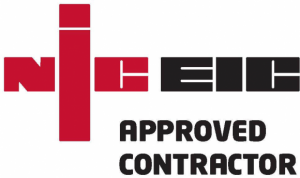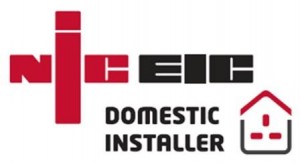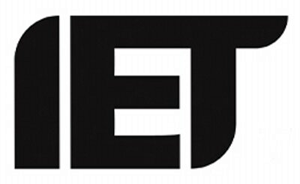We are proud of our work and accredited to the highest level.
NICEIC Approved Contractors
NICEIC has been assessing the technical competence of contractors for over 50 years. Their aim is to protect everyone who uses electricity from unsafe electrical installations in their  homes, places of work and leisure. To achieve this, we maintain a register of electrical contractors that we assess as complying with the various standards, codes of practice and Scheme rules. Contractors registered by NICEIC are assessed on a regular basis to ensure that they are competent and capable of meeting the relevant technical and safety standards, codes of practice and rules of the Schemes they are registered to.
homes, places of work and leisure. To achieve this, we maintain a register of electrical contractors that we assess as complying with the various standards, codes of practice and Scheme rules. Contractors registered by NICEIC are assessed on a regular basis to ensure that they are competent and capable of meeting the relevant technical and safety standards, codes of practice and rules of the Schemes they are registered to.
NICEIC Domestic Installer
NICEIC’s Domestic Installer Scheme has been approved to register installers to Full Scope or Defined Competence for domestic electrical installation work in  accordance with Part P Building Regulations. The scheme covers design, installation and inspection and testing and certification of electrical installation work associated with dwellings, intended to operate at low or extra low voltage.
accordance with Part P Building Regulations. The scheme covers design, installation and inspection and testing and certification of electrical installation work associated with dwellings, intended to operate at low or extra low voltage.
TRUSTMARK
TrustMark is a quality mark which operates a framework under which 30 plus scheme operators work in the RMI (repair, maintenance and improvement) sector, including trade associations, local government trading  standards teams, and independent scheme operators. These schemes are approved to carry the TrustMark logo and recruit reputable and trustworthy tradesmen. This enables the TrustMark scheme operators to promote improved RMI sector standards, and tackle related issues such as better enforcement. All of these scheme operators are audited annually by TrustMark, to ensure processes, standards and complaint procedures are being maintained.
standards teams, and independent scheme operators. These schemes are approved to carry the TrustMark logo and recruit reputable and trustworthy tradesmen. This enables the TrustMark scheme operators to promote improved RMI sector standards, and tackle related issues such as better enforcement. All of these scheme operators are audited annually by TrustMark, to ensure processes, standards and complaint procedures are being maintained.
IET
The Society of Telegraph Engineers formally came into existence on 17 May 1871. Since then the organisation has evolved and broadened its scope reflecting changes in technology. The Institution of Electrical Engineers (IEE),  as it was from 1889, became the Institution of Engineering and Technology in 2006.
as it was from 1889, became the Institution of Engineering and Technology in 2006.
The IET is one of the world’s leading professional societies for the engineering and technology community, with more than 150,000 members in 127 countries and offices in Europe, North America and Asia-Pacific. The IET provides a global knowledge network to facilitate the exchange of ideas and promote the positive role of science, engineering and technology in the world.

